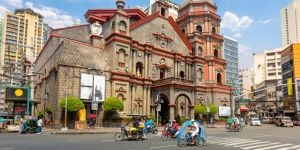The importance of local language in the Philippines
Last activity 13 June 2023 by bigpearl
314 Views
19 replies
Subscribe to the topic
Post new topic
Hey everyone,
As an expat, language questions often arise due to the need to communicate effectively in a new country. We’re curious to read your experiences with learning and using the local language in the Philippines.
Here are some questions to get started:
What is the local language spoken in the Philippines? Did you learn and use it? How difficult was it to learn?
Are there any resources or services available to help expats learn the local language? What are your tips?
What is the dominant language in the business environment? Have you had to conduct business meetings in the local language?
How does language proficiency contribute to understanding the local culture? Are there any specific cultural nuances or expressions that expats should be aware of?
How important is the local language for daily tasks such as shopping, transport, health and other services in the Philippines?
Let's share tips and advice on how to improve language skills and integrate into a new environment.
Thank you for your contribution.
Cheryl
Expat.com Team
@Cheryl I am here in the Philippines (Boracay) for more than 6 years now and I understand some Filipino. All important things here in the Philippines are done in English. So there is no need to learn Tagalog. This is one of the best things in the Philippines. Everyone understands and speaks at least a little English. So for the the day to day things, the local language is not needed. I was in Taiwan before. There it was a need to speak a little Mandarin.
All the best
Andy
@Cheryl
Hi All,
Here's my take on learning Filipino. Way back in the '80s of last century, I studied French for years to be able to communicate when in France. I also studied Spanish and Italian to visit those countries.
In the '90s & '2000s I lived and worked in Russia and then Ukraine (at the time at peace), where I studied Russian, a very difficult language indeed.
In 2017 I came to visit, then have lived mostly since then, in the Philippines. Taking past experiences as a principle, I began studying Tagalog for a couple months before arriving. In the first days here, this is what I experienced:
Me: Maganda umaga po.
Them: Good morning Sir.
Me: Kamusta po kayo?
Them: I'm fine, and you?
That's when I decided to forget learning Filipino.
Of course, in villages around locals it's good to know a little, but in general and for business, most educated people will do business in English if around foreigners, like to talk in English, pride themselves in their knowledge of English. You see mothers walking on the street every day speaking in English to their children, and folks from other Asian countries come to the Philippines to study English with local teachers here.
So, if you love language study, knock yourself out and study Tagalog or any of the local dialects here. For me it was a breath of fresh air not to have to struggle with yet another foreign language. You can have a nice chat even with taxi drivers or shop staff in English.
And for all the things I complain about (noisy motorbikes, open fires, crowds etc.) the Filipino people are overall very accommodating.
Hey Andy_1963,
I appreciate you taking the time to share this information with us.
Between Filipino and Tagalog, which one is more commonly spoken though?
Would you also agree that one can be culturally involved without necessarily learning the local language?
Cheers,
Cheryl
No need to learn Tagalog...a quite complex language but here in Davao the people speak Bisaya and English. I speak Bisaya sometimes with old persons. Bisaya is a dialect...no grammar rules...quite easy to learn if you speak Spanish, French or Italian. People are always surprised when you replied in Bisaya...specialy if the speak about you Like all over the world English take more and more place
Have always been happy to not understand Ilocano. Keeps me out of family squabbles, I can never be called as a witness, I get to be sergeant Schultz, "I know nothing."
Ive been in the Phillipines many times, i lived on several islands and rented houses there, i actualy lived there from 2014 untill 2018, due to work related issues i had to leave, i was planning to go back and had a holliday there in 2019, and than came corona. Its the country were i will live once retired, thats in 2 years from now. I found it needed to at least know some Tagalog (wich for me is the same thing as Filipino?) Its a language easy to pick up along the way, undo i will have lost some of what i learned back in the day, but i am pretty sure it will come back as fast as it left me. You dont absolutly need it but it is certainly helpfull especialy outside the citties. And Phillippinian people appreciate it if you try and even help you with it. You can find a few free courses on internet wich will not realy teach you to speak fluent but lay a solid foundation. And for a few bucks there are verry much teachers online who will love to teach you. Its a good not expensive investment for yourself and you also help a Phillipinian teacher financialy there.
When I first visited the Philippines in the early 80s there was little need to learn Filipino or Tagalog because the school curriculum was mostly in English, in fact kids as young as 5yo would come up to me and ask questions in broken English because it would help them in school if they could actually speak with an English speaker. All that changed when Cory Aquino came to power and allowed the schools to teach almost all subjects in Tagalog.
Today, kids of all ages speak a little English but feel more comfortable in their local dialect. Tagalog is the official language of communication whilst the older generations will still relate to Filipino - similar in many respects but different in some. In most business dealings you can use English if you are dealing with big bucks. If just small change dealings then go with local dialect or Tagalog if you can.
Having said that, if you speak English or Spanish you will find it easy to get along in the Central Visayan region (Cebu etc.). English and Bisayan are spoken through much of Mindanao although Davao has its own slant on Bisayan, and English is well understood mostly. The farther North you go then first Capampangan and then Ilocano are almost expected but English is mostly accepted.
If you decide to reside in a particular locale then it is always good to learn a few words/phrases in the local dialect if for no other reason than the locals will fall about laughing at your accidental / deliberate, grammatical / pronunciation errors and that will endear you to them . . . something I never found in my travels in China, Vietnam nor Thailand, where I felt ridiculed for my errors.
One thing you will find in almost all areas is that those who communicate in English at first, because you are a foreigner (English speaking assumed), may only have a little English comprehension and may complain about having “a nose bleed” if your dialog goes beyond the basics. Best advice, carry a travel pack of tissues with you and if you perceive the person struggling with the conversation offer a tissue and take one yourself . . . the result is almost always produce laughter as they then know that you know that language is for communication and you will have just communicated empathy – a wholly civilized and humanizing emotion.
@Cheryl I think most people would consider 'Filipino' to mean any locally-spoken language or dialect by Filipinos. Tagalog is one of the official languages of the Philippines (English being the other), so you might use Tagalog and Filipino interchangeably.
To answer your original question, like the other respondents, I have had no need to learn Tagalog or the local dialect in Cagayan de Oro (Bisayan or Cebuano, depending on who you ask). My wife speaks frequently in about 10 different languages, so learning from listening to her is impossible (and she mostly watches Netflix videos in Korean, Mandarin, and Japanese). Everyone in her family, as well as the families of all of our expat friends, speak excellent English and never seem shy about it.
Cheers -- Rich
I wasn't going to get into this but can't resist. Like your lovely wife Rich my better half is fluent in Tagalog, Ilicano (native) English 95%, Bicol, Spanish and a smattering of French. Our workers here are Ilicano with very limited English/education, Great guys and hard workers but English for them is difficult. My better half is the translator from English to Ilicano and guess what? They nod their heads, do what they want and stuff things up all the time,,,,, daily.
Knowledge of language can't fix stupid.
OMO.
Cheers, Steve
Hey everyone,
I would like to thank everyone for their contributions to this thread!
It is truly incredible to see how each person has shared their unique experiences and perspectives still with a pinch of humour.
Keep it up.
Cheers,
Cheryl
Expat.com team
Cheryl while language is important one can't fix stupidity nor excuses. no different to walking in department stores where no amount of I'm just browsing please stop hanging over my shoulder is met with yes sir and still like a magnet.
We generally walk out of the store, I understand these people are trying to do a job but at times they can be overpowering, don't know the meaning of we are simply looking, please stop hanging over my shoulder.
Cheers, Steve
hanging over my shoulder is met with yes sir and still like a magnet.
Although it can be frustrating, I think this happens in various parts of the world.
Cheryl while language is important one can't fix stupidity nor excuses. no different to walking in department stores where no amount of I'm just browsing please stop hanging over my shoulder is met with yes sir and still like a magnet.
We generally walk out of the store, I understand these people are trying to do a job but at times they can be overpowering, don't know the meaning of we are simply looking, please stop hanging over my shoulder.
Cheers, Steve
-@bigpearl
I had the same experience during my visits to the Philippines but the funny thing is that when you really want assistance, the staff seem to be nowhere to be seen. Buying shoes for my daughter? over there, we could not find an assistant to go in the store room and bring a pair of shoes out in the size we wanted.
"Filipino" would be Tagalog. My nieces and nephews take a "Filipino" course in high school and that course is the study of the Tagalog language. If you use Google translate, as I often do, you won't find Tagalog on the list of languages and dialects but you will find "Filipino" which will do a suitable translation of Tagalog into English. According to Wikipedia "Filipino" is the "standardized variety of Tagalog".
Filipino is rarely spoken in my neck of the woods but my wife speaks it fluently. She is also fluent in Cebuano and Waray Waray. Cebuano "is natively called by its generic term Bisaya or Binisaya (both translated into English as Visayan)". All the bankers and medical staff I've encountered speak English and my nieces and nephews as well as most high school students speak better English than I do. I'm picking up a few words and phrases but I doubt I will ever be able to have a conversation in any of the local dialects since there is no real pressure to do so.
I have no trouble communicating with professionals, their English & comprehension is excellent.
But I don't encounter them often, most of my dealings are with retail employees such as in S&R or Landers. I don't understand them and they don't understand me.
The only thing we have in common is the look of confusion on of our faces.
@mikelaf Visaya is not a dialect but a language.
I've been doing a small amount of research on language vs dialect. According to the Weinreich witticism "A language is a dialect with an army and navy".
At one point in history a language was both written and spoken and a dialect was only spoken, but I believe that is no longer true. According to an article in The Atlantic "there is no objective difference between the two" so there is no clear answer.
I live in the Visayas where the main language is called Bisaya or Visaya in English, but according to the Philippine website Nolisoli it is neither a language or a dialect. It is a language family consisting of languages or dialects spoken in the Visayas and northern Mindanao including Cebuano, Hiligaynon, Waray, Karay-a, and Surigaonon, among others. Locally the term typically refers to Cebuano.
Where we live the main Bisaya dialects are Cebuano and Waray. If dialects are locally spoken and similar would Cebuano be considered a language when compared to Tagalog or English?
Some Filipinos were taught in school that every spoken language that wasn't Tagalog was a dialect.
Languages aside misunderstandings are the biggest issue in our house between Ben and I and with the workers. locals also from time to time. All the workers here speak Ilocano as well as Tagalog but not so versed in English, hence the better half translating our wishes and directions daily,,,,, hourly, things still get lost in translation for some reason with excuses like "I forgot or that's not what you said" and that's why if you are building or any transactions you need to be on the ground, not here will lead to tears.
Cheers, Steve.
Articles to help you in your expat project in the Philippines
 Lifestyle in the Philippines
Lifestyle in the PhilippinesAbout to move to the Philippines? Wondering how you're going to adapt to your new environment and lifestyle? ...
 Getting married in the Philippines
Getting married in the PhilippinesGetting married in the Philippines provides a backdrop of immense beauty through stunning beaches, tropical ...
 Dating in the Philippines
Dating in the PhilippinesThe beauty of the Philippines, with its dramatic modern and old Spanish architecture, plus the golden sands and ...
 Obtaining a Philippines driving licence
Obtaining a Philippines driving licenceWhether you are converting your existing foreign driving license or applying as a first-timer for a Philippines ...
 Leisure activities in the Philippines
Leisure activities in the PhilippinesConsisting of more than 7,000 islands, the Philippines is a real treasure that you can explore during your stay ...
 Choosing your neighbourhood in Manila
Choosing your neighbourhood in ManilaChoosing a neighborhood is one of the most critical decisions that expats need to make when moving to Manila. Each ...
 Phones and Internet in the Philippines
Phones and Internet in the PhilippinesWhen moving to the Philippines, the first ‘essentials' is telecommunications; Getting a local sim card and ...
 Diversity and inclusion in the Philippines
Diversity and inclusion in the PhilippinesThe culture of the Philippines is very diverse. This is due to the large mix of different nations in this country, ...
Find more topics on the Philippines forum



